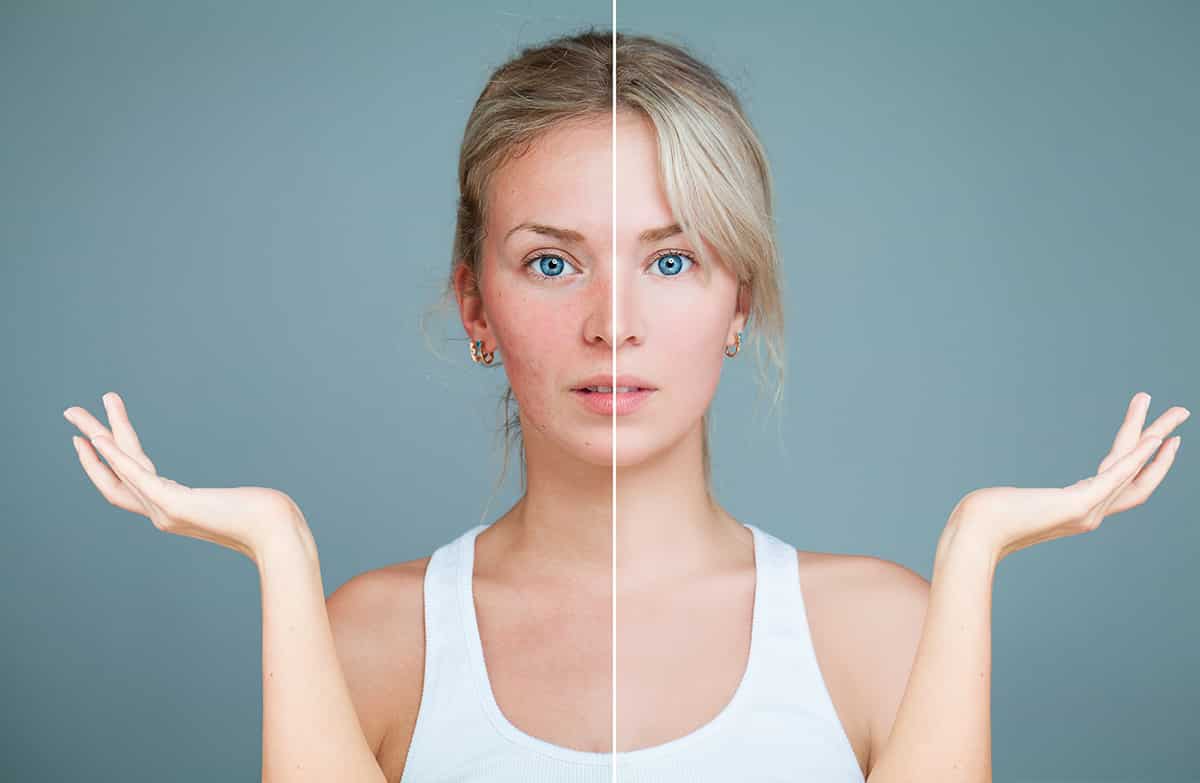Rosacea can be a difficult skin condition but can be managed with a skincare routine. Red skin causes embarrassment, social anxiety, and often individuals miss out on opportunities due to self-esteem issues.
What is Rosacea?
Rosacea is a chronic skin condition that causes inflammation and red bumps, most commonly on the face. Rosacea is extremely common, affecting 1 in 20 Americans. Rosacea is known to run in the family, but sun damage is thought to worsen the condition. Some doctors even believe bacteria in an individual’s gut can trigger Rosacea flare ups. The leading causes of Rosacea are still not fully understood, and more research is needed to understand why some people develop the condition. Rosacea is more common among individuals with fair skin, but the severity of the condition varies depending on the person.
Rosacea typically starts to develop with redness on the nose, chin cheeks, or forehead. More severe cases cause the blood vessels in the face to burst and can lead to further redness throughout the face and neck area. Other symptoms include:
- Stinging and Burning
- Swollen Nose
- Dry patches of skin
- Oversized pores
Individuals who have Rosacea tend to experience “flare-ups” that can last for a few days to a few weeks. During these flare-ups, symptoms tend to worsen, and lifestyle shifts or new medication may be necessary.
While Rosacea may not be life-threatening, it can still have a profound effect on an individual’s emotional well-being. The National Rosacea Society reports that 76% of people with the condition say they have low self-esteem. Anxiety triggered by Rosacea symptoms can also work to worsen flushed skin further, creating a vicious cycle.
Lifestyle Changes
Unfortunately, there is no cure for Rosacea, but there are lifestyle changes as well as oral prescription therapy available that can help relieve symptoms.
Triggers for Rosacea flare-ups include foods, increased stress levels, and even an individual’s environment. Food and beverages that most commonly trigger Rosacea flare-ups include:
- Chocolate
- Alcohol
- Spicy Foods
- Heavily Marinated Meats
- Hot Drinks
- Fermented Foods
It is crucial for individuals who suffer from Rosacea to determine their triggers and develop a plan to avoid them. Rosacea makes the skin hyper-sensitive, so it’s a good idea to keep a log to track your daily activities as well as your food and drink intake to start determining what is triggering your flare-ups.
Many doctors and dermatologists recommend slight shifts in daily activities to help reduce redness, such as shorter, cooler showers. Hot showers, while relaxing, can strip essential oils from the skin and lead to dryness and irritation, the perfect combination for a Rosacea flareup.
Many individuals also find relief by investing in a humidifier for their homes. Humidifiers work to return moisture to the air, which can help prevent dry and red skin.
Direct sunlight is also a common trigger among people who have Rosacea, so you must apply sunscreen daily, especially during the summer months, to help protect the blood vessels beneath your skin.
Treatment Options
If one does not find relief from simple lifestyle changes, there are medications, both in the form of topicals and oral prescriptions that can help bring relief. One Rosacea treatment available is cream formulas, which are applied directly to red skin to bring relief. Typical cream formulas prescribed by dermatologists include:
- Brimonidine and oxymetazoline work to reduce redness by constricting blood vessels
- Tetracycline, doxycycline, and minocycline are antibiotics that work to keep the bacterial content caused by Rosacea under control as well as provide anti-inflammatory relief
- Azelaic Acid kills bacteria that infects pores by decreasing keratin production in the skin which effectively helps the swelling and redness in the face
Dr. Lombardi recommends using Phyto Corrective Gel to help control the redness that pops up in both cold and heat. This gel is calming and helps to soothe irritated skin and reduce inflammation. Some of the active ingredients in this moisturizer are hyaluronic acid, cucumber, thyme, and other botanical ingredients. Retinol cream can also help by reducing inflammations that are typical of skin that is prone to Rosacea.
Vitamin C Serum
Free radicals are unstable molecules within our bodies that can damage cells, proteins, and even an individual’s DNA. They form when atoms or molecules lose or gain electrons and can be very dangerous. Free radicals can work to damage an individual’s skin by taking electrons from the skin, which can cause redness and speed up the aging process.
Vitamin C serums not only work to help reduce the appearance of redness and inflammation; it also can help to repair cellular damage caused by free radicals and prevent their formation. Vitamin C serums help to strengthen the skin barrier, which increases moisture levels in the skin, keeping it soft and supple. Dr. Lombardi recommends trying a Vitamin C Serum
Individuals who suffer from Rosacea often feel a sense of hopelessness from their loss of self-confidence. If this is you, there are lifestyle changes and medications available to help bring you relief from your symptoms. Talk to your doctor or dermatologist today to determine which option is right for you.

